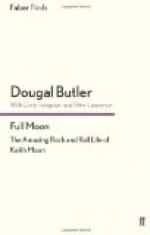“I had a little money left when I landed in England—not much, but sufficient to take me to my wife and support me until I found Robert Turold. I had left my wife living with her parents in a London suburb. Robert Turold and I had both been in love with her before we left England. She loved me, but he had some strange kind of influence over her—the dominance of a strong nature over a weak, I think. Or perhaps it was a more primitive feminine instinct. He was always the strong man—even then—ruthless, determined. It was strange that he should have loved such a gentle timid creature, though that, perhaps, was not so strange as a man like Robert Turold loving any woman. But love her he did.
“She had a great capacity for affection—she was one of those women who have to love, and be loved. Her guileless face, her appealing eyes, seemed to beseech the protection of a masculine shield in a world which has no mercy for the weak. She was born to be guided, to be led. It was my fear of her simple trustful disposition which led me to urge her to marry me secretly before I left England with Turold. Her parents did not favour me, and they wished their daughter to marry well—there was an aunt from whom she had expectations, and the aunt had a prospective husband in view for her. I feared their joint influence. She consented willingly enough; she was easy to persuade—on the eve of our parting. She clung to me weeping—her husband.
“I was to make enough money to return to England to claim her in a year or so—that was the plan. But I had been absent nearly three when I was left on the island. And another twelve months passed before I reached England again. Four years! A long time. Almost any combination of circumstances can be brought about in such a period. People die, marry, or can be forgotten as though they had never existed. It was my lot to be forgotten.
“I hastened to London, to my wife’s old home, and learnt that the family no longer lived there. Where had they gone to? The maid who opened the door could not tell me—she did not know. At my request she went for her mistress. The lady of the house came down to me, a tall slender woman, indifferent, but well-bred enough to be polite. She had taken the house from the Bruntons, she said. It was too large for them after their daughter’s marriage. It was dusk, and she could not see my face, but she heard my startled exclamation—’Married? To whom?’ To a Mr. Turold—a very suitable match. They had been married for some months, and she was expecting a child.
“How she gathered that last piece of information I do not know. Perhaps she and Mrs. Brunton exchanged letters—women write to one another on the slightest pretexts. That thought made me cautious. Fortunately, I had not given my name. I thanked her, and rose to go. She offered to write down the Bruntons’ address for me (they had gone to live in the country), but I said I could remember it. And I got away from the house in the gathering darkness without her actually seeing my face—not that it would have mattered much, if she had.




